Woman searching for birth parents found dad was a friend on Facebook
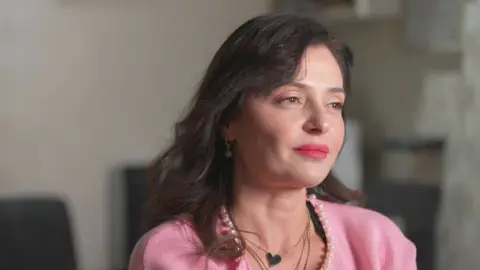 BBC
BBCTamuna Museridze took a deep breath and made the phone call she had dreamed of since finding out that she might be adopted.
She was calling the woman she believed was her biological mother. She knew it might not lead to a fairy tale reunion - but she didn't expect the response to be cold and angry.
“She started screaming, shouting - she said she hadn’t given birth to a child. She didn't want anything to do with me,” Tamuna recalls, explaining she felt more surprised than upset by the response.
“I was ready for anything, but her reaction was beyond anything I could imagine.”
Tamuna wasn’t prepared to walk away just yet. She wanted to know the circumstances of her adoption, and there was something else she wanted that only her mother could give her - the name of her father.
Tamuna’s search had begun in 2016, after the woman who raised her died. Clearing out her house, Tamuna found a birth certificate with her own name on it but the wrong birth date, and she started to suspect she was adopted. After doing some research, she set up a Facebook group called Vedzeb, or I’m Searching, hoping to find her birth parents.
Instead, she uncovered a baby trafficking scandal in Georgia that has affected tens of thousands of lives. Over many decades, parents were lied to and told their newborn babies had died – the infants were then sold.
Tamuna is a journalist and her work has reunited hundreds of families, yet - until now - she couldn’t solve the mystery of her own origins and wondered if she too had been stolen as a child.
“I was a journalist on this story, but it was a personal mission for me as well,” she says.
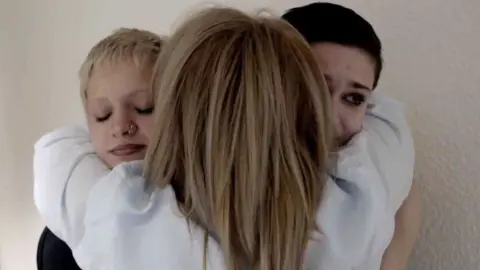
The breakthrough in her search had come in the summer, when she received a message through her Facebook group. It was from someone who lived in rural Georgia, who said they knew a woman who had concealed a pregnancy and given birth in Tbilisi in September 1984. That’s around the time Tamuna was born - a date she had shared publicly.
The person believed the woman was Tamuna’s birth mother - and crucially they gave a name.
Tamuna immediately searched for her online but when she couldn’t find anything, she decided to post an appeal on Facebook asking if anyone knew her.
A woman soon responded, saying the woman who had concealed the pregnancy was her own aunt. She asked Tamuna to take the post down but she agreed to do a DNA test.
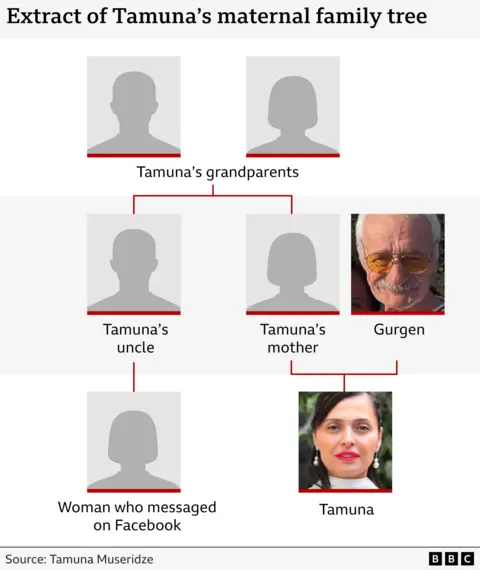
While they were waiting for the results, Tamuna made the phone call to her mother.
A week later, the DNA results arrived, indicating that Tamuna and the woman on Facebook were indeed cousins. Armed with this evidence, Tamuna managed to convince her mother to acknowledge the truth and reveal the name of her father. It was a man called Gurgen Khorava.
“The first two months were shocking, I couldn’t believe these things were happening to me,” she recalls, “I couldn’t believe I had found them.”
Once Tamuna had Gurgen’s name, she quickly tracked him down on Facebook. It turned out that he had been following her story on social media - her work reconnecting families is widely known across Georgia.
Tamuna was amazed to find that he had “been in my friend list for three years”. He just hadn’t realised he was a part of her story.
“He didn’t even know my birth mother had been pregnant,” says Tamuna. “It was a huge surprise for him."
They soon arranged to meet in his hometown of Zugdidi in western Georgia – about 160 miles (260km) from where she lives in Tbilisi.
Looking back, Tamuna thinks she was in a state of shock, but as she walked up to Gurgen’s garden gate, she felt surprisingly calm.
When the 72-year-old appeared, they hugged, then stopped to take a moment to look at each other, smiling.
“It was strange, the moment he looked at me, he knew that I was his daughter,” she recalls. “I had so many mixed emotions.”
She had a lot of questions and didn’t know where to start. “We just sat together, watching each other and trying to find something in common,” she says.
As the two of them chatted, they realised they shared a lot of interests - Gurgen had once been a renowned dancer at the State Ballet of Georgia, and was delighted to learn that Tamuna’s daughters - his granddaughters - shared his passion.
“They both love dancing, and so does my husband,” she says with a smile.
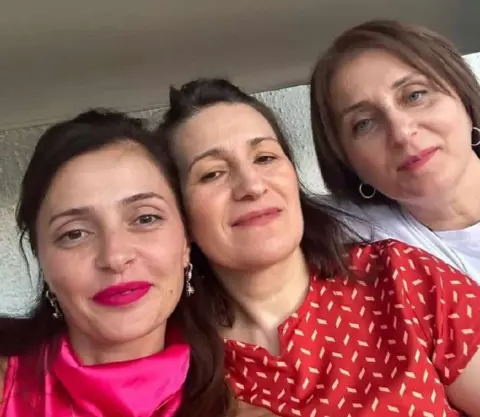 Tamuna Museridze
Tamuna MuseridzeGurgen invited his entire family to his home to meet Tamuna, introducing her to a large group of new relatives - half siblings, cousins, aunts, and uncles. The family agreed there was a strong resemblance between them. “Out of all his children, I look the most like my father,” she says.
They spent an evening sharing stories, eating traditional Georgian food, and singing while Gurgen played the accordion.
Even though she had now met her father, Tamuna still had a niggling question: had she - like thousands of other Georgians - been stolen from her mother at birth and sold? Her adoptive parents were no longer alive so she couldn’t turn to them for answers.
She finally got a chance to ask her birth mother in October. A Polish TV company was filming a documentary about Tamuna and took her to meet her mother, who agreed to talk to her in private.
Unlike many people Tamuna has helped to reunite, she discovered that she had not been a stolen child herself. Instead, her mother had given her up and kept the secret for 40 years.
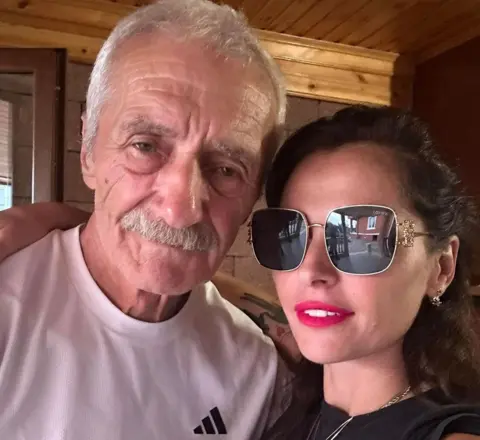 Tamuna Museridze
Tamuna MuseridzeHer mother and father were not in a relationship and had only had a brief encounter. Her mother - overwhelmed by shame - chose to hide her pregnancy. In September 1984, she travelled to Tbilisi, telling people she was going for surgery, and instead gave birth to a daughter. She stayed there until arrangements were made for Tamuna’s adoption.
“It was painful to learn that I spent 10 days alone with her before the adoption. I try not to think about that,” Tamuna reflects.
She says that her mother asked her to lie and tell people she had been stolen. “She told me that if I would not say that I was stolen, everything would end between us… and I said that I couldn’t do that."
Tamuna feels this would be unfair to all the parents whose babies were stolen. “If I lie, nobody's going to believe those mothers any more,” she explains.
Her mother then asked her to leave the house and they have not spoken since.
“Would I do it all again?” she reflects. “Of course I would, I found out so much about my new family.”
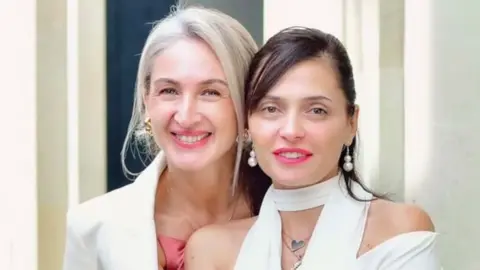 Tamuna Museridze
Tamuna Museridze
Twins Amy and Ano were taken from their mother as babies and sold. They found out about each other by chance and soon discovered thousands of others in Georgia who were also stolen from hospitals.
Watch more on this story on the BBC iPlayer (UK only).
You can also watch the documentary on YouTube.

